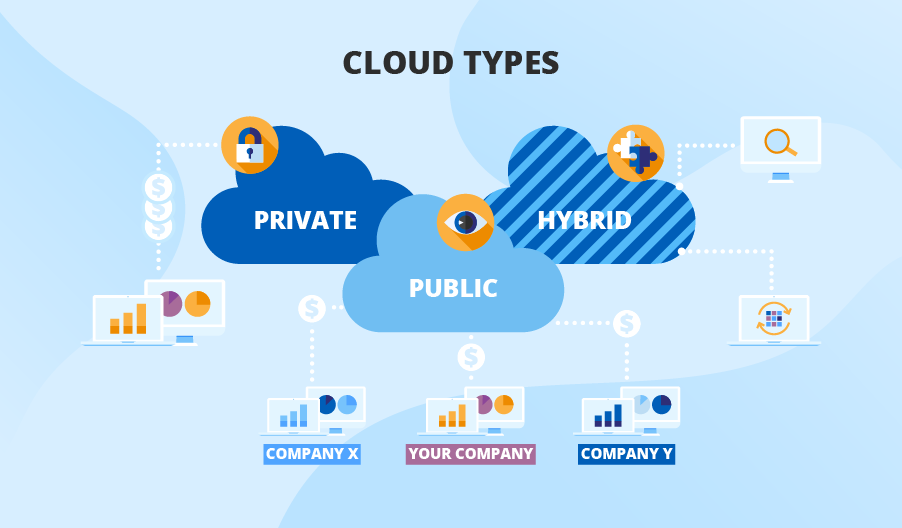Cloud-based BI (Business intelligence) is the process of collecting, analyzing, and interpreting data to provide insights that can help businesses make better decisions.
BI tools can help businesses to track their performance, identify trends, and forecast future results.
Traditionally, BI solutions have been expensive and complex to implement, making them out of reach for many small businesses. However, the rise of cloud computing has made BI more accessible and affordable for small businesses of all sizes.

Cloud-based BI solutions offer a number of advantages for small businesses, including:
- Affordability: Cloud-based BI solutions are typically billed on a subscription basis, which can help small businesses to avoid the upfront costs associated with on-premises BI solutions.
- Scalability: Cloud-based BI solutions can be easily scaled up or down to meet the needs of a growing business.
- Ease of use: Cloud-based BI solutions are typically designed to be easy to use, even for users with limited technical expertise.
- Accessibility: Cloud-based BI solutions can be accessed from anywhere with an internet connection, which can be helpful for small businesses with remote employees.
Here are some examples of how small businesses can use BI to improve their business:
- Track sales performance: BI tools can help businesses to track their sales performance over time, identify trends, and forecast future sales. This information can be used to make better decisions about inventory, pricing, and marketing campaigns.
- Improve customer service: BI tools can help businesses to identify customer satisfaction trends, track customer support tickets, and identify areas where customer service can be improved.
- Reduce costs: BI tools can help businesses to identify areas where costs can be reduced, such as by identifying inefficient processes or by eliminating unnecessary expenses.
- Make better product decisions: BI tools can help businesses to identify which products are most popular with customers, track product profitability, and identify areas where new products or services could be developed.
Here are some tips for choosing a cloud-based BI solution for your small business:
- Consider your needs: What specific business intelligence questions do you need to answer? Make sure to choose a solution that can provide the insights you need.
- Ease of use: Choose a solution that is easy to use, even for users with limited technical expertise.
- Scalability: Choose a solution that can be scaled up or down to meet the needs of your growing business.
- Affordability: Choose a solution that is affordable for your budget.
Some of the best cloud-based BI solutions for small businesses include:
- Zoho Analytics: Zoho Analytics is a cloud-based BI solution that offers a variety of features, including data visualization, dashboards, and reporting. It is easy to use and affordable, making it a good option for small businesses.
- Tableau: Tableau is a popular cloud-based BI solution that offers powerful data visualization and analysis capabilities. It is more expensive than Zoho Analytics, but it is a good option for small businesses with more complex data needs.
- Microsoft Power BI: Microsoft Power BI is a cloud-based BI solution that offers a variety of features, including data visualization, dashboards, and reporting. It is integrated with other Microsoft products, such as Excel and Office 365, making it a good option for small businesses that already use Microsoft products.
How to implement a cloud-based BI solution
Once you have chosen a cloud-based BI solution, you will need to implement it. Here are some steps to follow:
Connect your data sources: The first step is to connect your data sources to the BI solution. This may include data from your CRM system, ERP system, accounting system, and other sources.
Clean and prepare your data: Once your data sources are connected, you will need to clean and prepare your data. This may involve removing duplicate data, correcting errors, and formatting the data in a consistent way.
Create dashboards and reports: Once your data is clean and prepared, you can start creating dashboards and reports. Dashboards provide a visual overview of your key metrics, while reports provide more detailed insights.
Share your dashboards and reports with your team: Once you have created your dashboards and reports, you can share them with your team. This will help everyone in your organization to make better decisions based on data.
Benefits of cloud-based BI for small businesses
There are a number of benefits to using cloud-based BI for small businesses, including:
Improved decision-making: Cloud-based BI can help small businesses to make better decisions by providing them with insights into their data. This information can be used to make decisions about everything from inventory levels to marketing campaigns to product development.
Increased revenue: Cloud-based BI can help small businesses to increase their revenue by identifying new sales opportunities, improving customer retention, and optimizing their pricing.
Reduced costs: Cloud-based BI can help small businesses to reduce costs by identifying inefficient processes, eliminating unnecessary expenses, and improving supply chain management.
Improved customer satisfaction: Cloud-based BI can help small businesses to improve customer satisfaction by identifying customer needs and preferences, and by tracking customer feedback.
Competitive advantage: Cloud-based BI can give small businesses a competitive advantage by helping them to make better decisions and to operate more efficiently.
Case studies
Here are a few case studies of small businesses that have used cloud-based BI to improve their performance:
Certainly, here are a few case studies of small businesses that have leveraged cloud-based Business Intelligence (BI) to enhance their performance:
1. XYZ Boutique Clothing Store:
Challenge: XYZ Boutique faced challenges in optimizing inventory management and understanding customer preferences.
Solution: They adopted a cloud-based BI solution to analyze sales data, customer trends, and inventory turnover in real-time.
Results: With actionable insights, XYZ Boutique optimized stock levels, introduced popular products, and improved customer satisfaction. They also saved costs by avoiding overstocking.
2. ABC Coffee Roastery:
Challenge: ABC Coffee Roastery needed to identify cost-saving opportunities in their production process.
Solution: They implemented a cloud-based BI platform to track production costs, analyze machine efficiency, and identify areas for improvement.
Results: By leveraging BI insights, ABC Coffee Roastery reduced production costs by 15%, enhanced product quality, and streamlined their operations.
3. LMN Tech Solutions (IT Service Provider):
Challenge: LMN Tech Solutions aimed to enhance client satisfaction and maintain a high service quality level.
Solution: They integrated cloud-based BI to monitor service ticket data, analyze response times, and measure client satisfaction metrics.
Results: LMN Tech Solutions improved response times by 20%, leading to higher client satisfaction scores and increased business referrals.
4. PQR E-commerce Startup:
Challenge: PQR, a growing e-commerce startup, needed to identify sales trends and optimize marketing campaigns.
Solution: They adopted a cloud-based BI platform to analyze website traffic, sales data, and customer behavior.
Results: By using BI insights, PQR increased their website conversion rate by 10%, refined their marketing strategies, and achieved a 25% boost in monthly sales.
Conclusion
Cloud-based BI can be a valuable tool for small businesses of all sizes. It can help businesses to improve their decision-making, increase revenue, reduce costs, improve customer satisfaction, and gain a competitive advantage.
Additional tips for implementing cloud-based BI in your small business
- Start small: Don’t try to implement a complex BI solution overnight. Start by identifying a few key business questions that you want to answer with BI. Then, choose a solution that can help you to answer those questions.
- Get buy-in from your team: It’s important to get buy-in from your team before implementing a new BI solution. Explain to your team how BI can help them to do their jobs better and to make better decisions.
- Train your team: Once you have implemented a BI solution, make sure to train your team on how to use it. This will help everyone in your organization to get the most out of the solution.
- Monitor your results: Once you have implemented a BI solution, monitor your results to see if it is helping you to achieve your goals. If you are not seeing the results you want, make adjustments to your solution or to the way you are using it.
Cloud-based BI can be a powerful tool for small businesses. By following these tips, you can successfully implement a cloud-based BI solution in your business and start to see the benefits.


